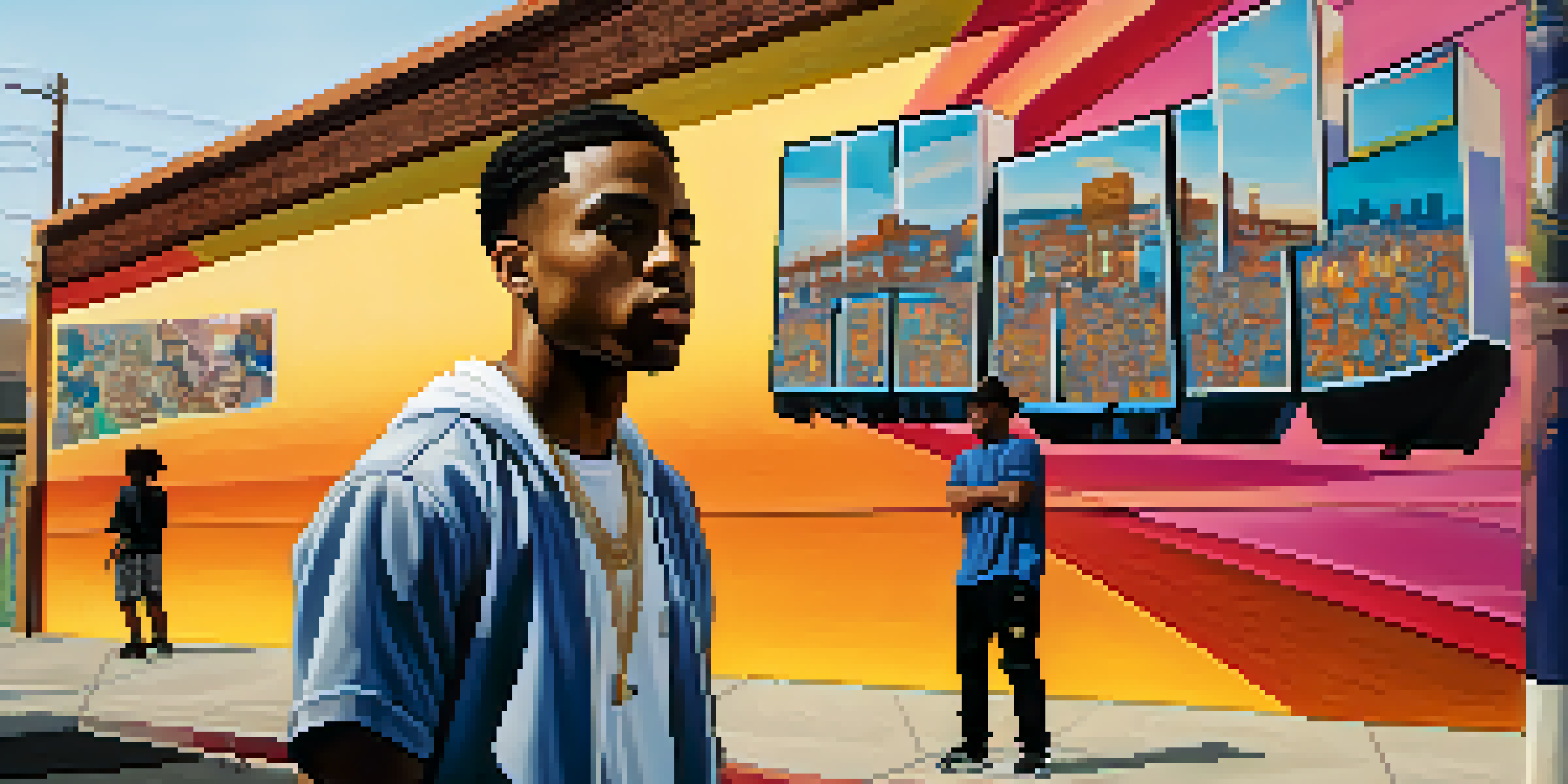The Rise of Eazy-E: Compton's Iconic Hip-Hop Pioneer

Eazy-E's Early Life: Roots in Compton
Eric Wright, known as Eazy-E, was born on September 7, 1964, in Compton, California. Growing up in a challenging environment, he faced the realities of street life, which would later influence his music. His early experiences shaped his perspective and provided rich material for his lyrics.
I’m not saying I’m going to change the world, but I guarantee that I will spark the brain that will change the world.
As a teenager, Eazy-E showed a keen interest in music, particularly in the burgeoning hip-hop scene. He started out selling drugs to support his family but eventually transitioned into the music industry. This shift marked the beginning of a transformative journey that would redefine hip-hop.
His love for music led him to discover the power of storytelling through rap, and he quickly became a local figure in Compton's underground scene. This passion would soon evolve into a career that put him at the forefront of a cultural revolution.
The Birth of N.W.A: A Game-Changer
In 1987, Eazy-E co-founded the groundbreaking hip-hop group N.W.A, alongside Dr. Dre, Ice Cube, and others. This group would become synonymous with the 'gangsta rap' genre, pushing boundaries and addressing social issues head-on. Their debut album, 'Straight Outta Compton,' was a defining moment in hip-hop history.

The album was not just a collection of songs; it was a raw, unfiltered portrayal of life in Compton, highlighting issues like police brutality and systemic racism. N.W.A's lyrics resonated with many, sparking both acclaim and controversy nationwide. This duality showcased the power of hip-hop as both art and activism.
Eazy-E's Impact on Hip-Hop Culture
Eazy-E co-founded N.W.A, redefining hip-hop with their raw portrayal of life in Compton and addressing social issues.
Eazy-E's distinctive voice and charismatic presence helped propel the group into the spotlight. His ability to connect with audiences through his music made him a vital figure in the genre and an icon of the West Coast hip-hop movement.
Eazy-E's Solo Career: Finding His Voice
After achieving massive success with N.W.A, Eazy-E embarked on a solo career that allowed him to further explore his artistic vision. His debut album, 'Eazy-Duz-It,' released in 1988, solidified his status as a solo artist. The album featured hits like 'Eazy-er Said Than Dunn,' showcasing his unique style.
Music is a weapon. Music is a message. And music is a movement.
Eazy-E's solo work maintained the gritty realism that fans loved, but also allowed for more personal expression. He was able to experiment with different sounds while still staying true to his roots. This balance of innovation and authenticity resonated with fans and kept his music relevant.
Additionally, his solo success helped pave the way for other artists in the genre, proving that there was room for individual voices within hip-hop. Eazy-E's influence extended beyond his own music, impacting a generation of rappers who followed in his footsteps.
Eazy-E's Role as a Music Executive
Beyond performing, Eazy-E played a crucial role as a music executive and entrepreneur. He founded Ruthless Records in 1987, which became a platform for many aspiring artists. This move not only showcased his business acumen but also his commitment to nurturing talent.
Under his guidance, Ruthless Records launched the careers of several notable artists, including Bone Thugs-n-Harmony. Eazy-E's ability to spot potential in others helped diversify the sound of hip-hop, contributing to its evolution as a genre. His legacy as a label owner is just as significant as his work as a performer.
Legacy as a Music Executive
As the founder of Ruthless Records, Eazy-E nurtured emerging talent, influencing the direction of hip-hop as both an art form and a business.
Eazy-E's entrepreneurial spirit demonstrated that hip-hop could be both an art form and a viable business. This shift encouraged many artists to take control of their careers and pursue their own ventures, creating a more dynamic industry.
Controversies and Challenges: Facing Criticism
Throughout his career, Eazy-E faced numerous controversies, particularly regarding the explicit nature of his lyrics. Critics often labeled his music as promoting violence and misogyny, sparking debates about the impact of hip-hop culture. Eazy-E defended his work as a reflection of his lived experiences, emphasizing the importance of authenticity.
Despite the backlash, his music continued to resonate with fans who appreciated the unvarnished truth of his storytelling. He often used his platform to highlight societal issues, prompting discussions about race, poverty, and inequality. This willingness to confront uncomfortable topics set him apart in the music industry.
Eazy-E's ability to navigate criticism while staying true to his vision showcased his resilience. He remained a polarizing figure, but his impact on hip-hop and culture cannot be denied, as he pushed boundaries and challenged the status quo.
Eazy-E's Health Struggles: A Personal Battle
In the early 1990s, Eazy-E faced a personal battle that would ultimately change his life. In 1995, he was diagnosed with AIDS, a revelation that shocked both his fans and the music community. Eazy-E used his diagnosis as a platform to raise awareness about the disease, particularly in the hip-hop community.
His openness about his health struggles was groundbreaking at the time and helped destigmatize conversations around HIV/AIDS. Eazy-E's willingness to share his story encouraged others to seek testing and treatment, highlighting the importance of health education. This advocacy added another layer to his legacy, showcasing his impact beyond music.
Health Advocacy and Personal Struggles
Eazy-E's battle with AIDS in the 1990s raised awareness and destigmatized discussions about HIV/AIDS in the hip-hop community.
Eazy-E's fight against the disease was not just a personal journey but also a testament to his strength and character. He continued to work on his music and support fellow artists, even in the face of significant challenges. His untimely death in 1995 at the age of 31 left a profound void in the hip-hop world.
Eazy-E's Legacy: An Enduring Influence
Eazy-E's legacy continues to resonate in today's hip-hop landscape, influencing countless artists across genres. His contributions to gangsta rap and the West Coast sound helped shape the genre's identity. Many contemporary rappers cite him as a major influence, demonstrating the lasting impact of his work.
His ability to blend storytelling with social commentary created a blueprint for future artists. Eazy-E's music addressed real-life issues, encouraging others to use their platforms to speak out. This dedication to authenticity and activism remains a hallmark of hip-hop culture.

Moreover, Eazy-E's life story serves as a reminder of the power of music to transcend barriers and connect people. His journey from the streets of Compton to becoming a global icon is a testament to talent, resilience, and the transformative nature of hip-hop.